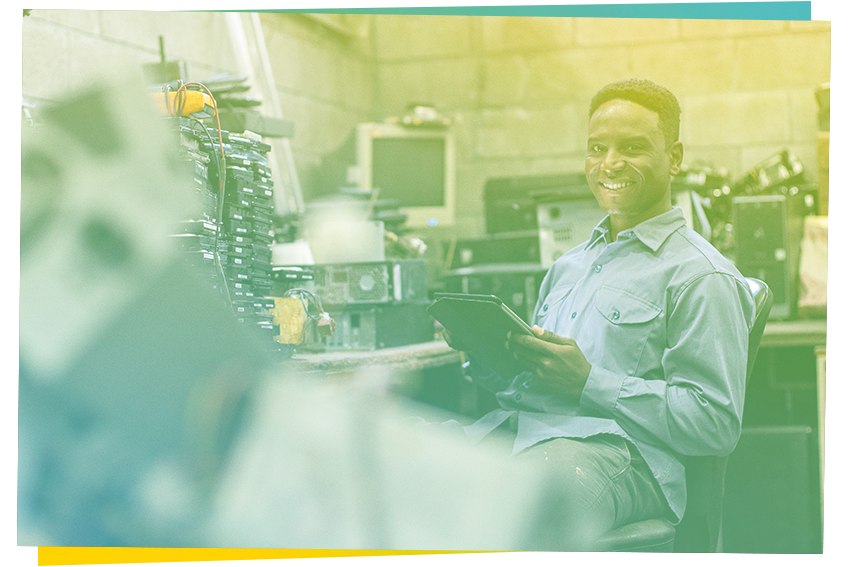BIG GROWTH:
CIRCULAR ECONOMY
INNOVATION PROGRAMME
For businesses developing circular economy solutions
Register your interestA fully funded programme of support for South London-based businesses and third-sector organisations creating circular economy solutions or looking to implement circular economy principles into their business.
![]()
Why take part?
Circular economy solutions refer to strategies and practices aimed at minimising waste and maximising the use of resources by keeping products, components, and materials in use for as long as possible through reuse, recycling, and regeneration. Circular economy and design are deeply interconnected concepts and design in the context of the circular economy refers to the intentional creation of products, services, and systems that adhere to the principles of circularity.
Guided by London South Bank University (LSBU), this initiative receives funding from the UK government via the UK Shared Prosperity Fund. Acknowledging the importance of this sector, the programme aims to assist companies in accelerating their technology/product development, tapping into the specialised expertise and facilities at LSBU, and fostering connections within a network of circular economy companies and academics.
LSBU boasts influential and globally renowned research in this field, showcasing a robust history of collaborating with industry to find new work approaches and innovative business models.

What format will it take?
Get support through a series of easy-to-access online webinars, with the opportunity to gain dedicated expertise from one of LSBU’s academic teams to either evaluate an existing product or service or provide expertise to develop a new one.
This programme provides you with the chance to collaborate with LSBU academics in developing or testing your circular economy product or service. We encourage applications from businesses aiming to establish an evidence base for their product.
The academic collaboration may involve technical support in product/service development or research projects to assess usability, safety, and/or efficacy independently.
Participation in the programme includes easy-to-access online webinars, with the opportunity to gain dedicated expertise from one of LSBU’s academic teams to either evaluate an existing product or service or provide expertise to develop a new one.
This presents a unique opportunity to access high-quality expertise on a fully funded basis. The four-month programme concludes with a showcase where you can demonstrate your products and services, expand your network, and generate momentum for your business. There is potential for a longer-term collaboration with LSBU.

Who can take part?
This initiative welcomes participation from startups, established businesses, social enterprises, and charities located in the London boroughs of Croydon, Kingston upon Thames, Lambeth, Lewisham, Merton, Richmond, Southwark, Sutton, and Wandsworth.
The Circular Economy Cohort will cover various areas, regardless of whether your business operates in high-tech or low-tech sectors. Here are some key areas that the cohort will cover:
- Introduction to Circular Economy
- Eco-design and Design for circularity
- Introducing circular solutions to your business / organisation
- Increase your existing circular solutions and improve your products and services
- Measuring circularity
- Introduction to the principles of Life Cycle Sustainability Assessment (LCA) and circularity
- How to use the Circular Data Centre Compass – An online tool designed to assist Data Centre Industry businesses in IT design/procurement/end-of-life decision making

This project is funded by the UK government through the UK Shared Prosperity Fund.
The UK Shared Prosperity Fund is a central pillar of the UK government’s Levelling Up agenda and provides £2.6 billion of funding for local investment by March 2025. The Fund aims to improve pride in place and increase life chances across the UK investing in communities and place, supporting local business, and people and skills. Find out more

